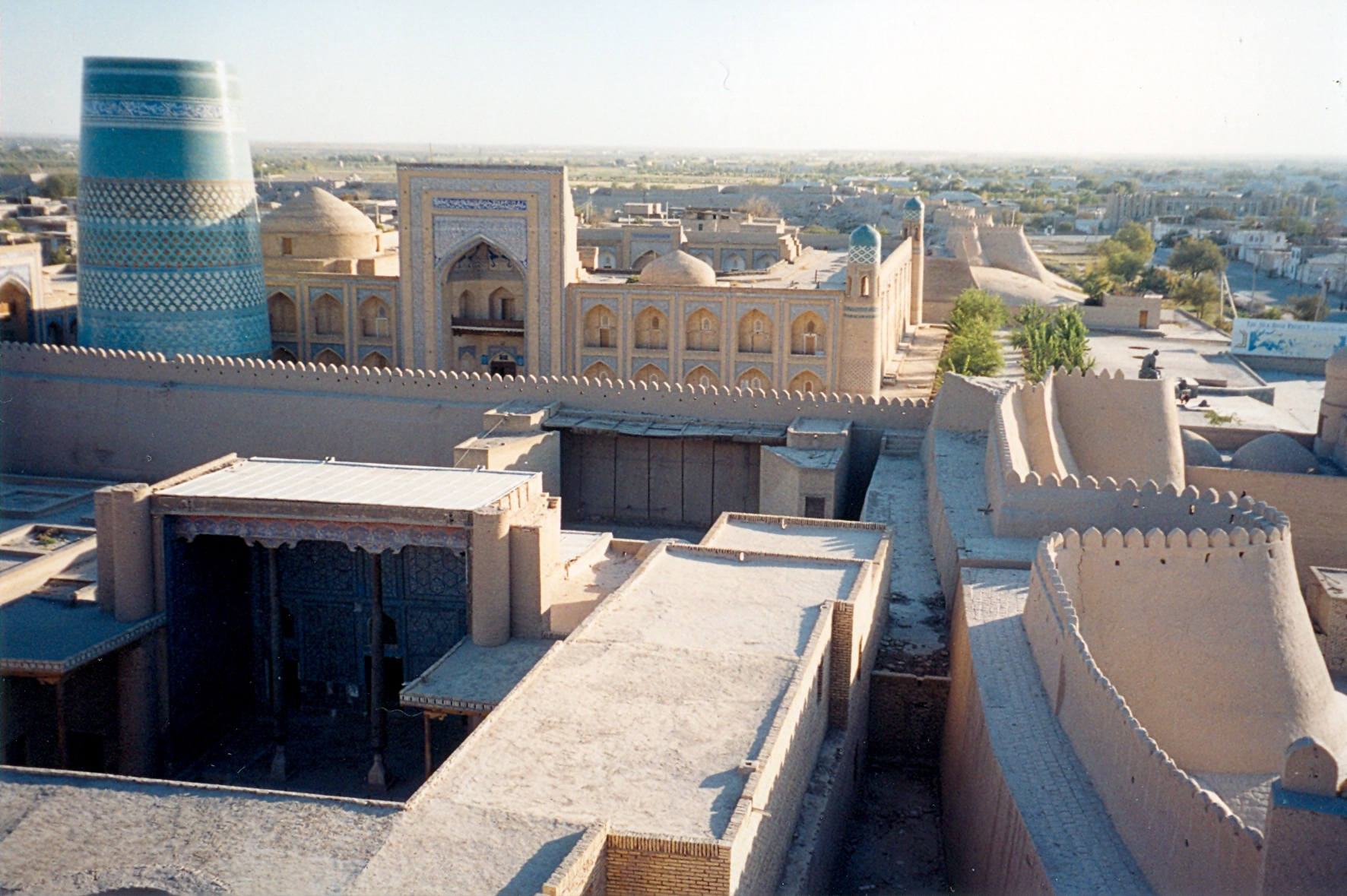- Khiva
Infobox Settlement
official_name = Khiva
native_name =
imagesize = 300px
image_caption = Walls of Itchan Kala
image_
map_caption =
pushpin_
pushpin_label_position =bottom
pushpin_mapsize = 300
pushpin_map_caption =Location in Uzbekistan
subdivision_type = Country
subdivision_type1 = Province
subdivision_name =
subdivision_name1 =Xorazm Province
subdivision_type2 =
subdivision_name2 =
established_title =
established_date =
government_type =
leader_title =
leader_name =
area_magnitude =
area_total_sq_mi =
area_total_km2 =
area_land_sq_mi =
area_land_km2 =
area_urban_sq_mi =
area_urban_km2 =
area_metro_km2 =
area_metro_sq_mi =
population_as_of=
population_footnotes =
population_total =
population_urban =
population_metro =
population_density_sq_mi =
population_density_km2 =
timezone =
utc_offset =
timezone_DST =
utc_offset_DST =
latd=41|latm=23|lats=|latNS=N
longd=60|longm=22|longs=|longEW=E
elevation_footnotes=
elevation_m =
elevation_ft =
postal_code_type =
postal_code =
area_code =
website =
footnotes =Khiva (Uzbek: Xiva, "Хива"; _ru. Хива, "Khiva"; Persian: خیوه "Khiveh"); Alternative or historical names include "Khorasam", "Khoresm", "Khwarezm", "Khwarizm", ( _ar. خوارزم), "Khwarazm", "Chiwa", and "Chorezm") is the former capital of
Khwarezmia and theKhanate of Khiva and lies in the present-day Khorezm Province ofUzbekistan .Itchan Kala in Khiva was the first site inUzbekistan to be inscribed in theWorld Heritage List (1991).History
: "For further history of Khiva and the
Khanate of Khiva , see:Khwarezmia "In the early part of its history, the inhabitants of the area were from Iranian stock and spoke an Eastern Iranian language called
Khwarezmian .The city of Khiva was first recorded by Muslim travellers in the 10th century, although archaeologists assert that the city has existed since the 6th century. By the early 17th century, Khiva had become the capital of the
Khanate of Khiva , ruled over by a branch of the Astrakhans, a Genghisid dynasty.In 1873, Russian General Von Kaufman launched an attack on the city, which fell on
28 May ,1873 . Although the Russian Empire now controlled the Khanate, it nominally allowed Khiva to remain as a quasi-independentprotectorate .Following the
Bolshevik seizure of power after theOctober Revolution , a short lived Khorezm People's Soviet Republic was created out of the territory of the old Khanate of Khiva, before its incorporation into theUSSR in 1924, with the city of Khiva becoming part of the Uzbek Soviet Socialist Republic.ights
Khiva is split into two parts. The outer town, called Dichan Kala, was formerly protected by a wall with 11 gates. The inner town, or
Itchan Kala , is encircled by brick walls, whose foundations are believed to have been laid in the 10th century. Present-day crenellated walls date back to the late 17th century and attain the height of 10 meters.The large blue tower in the central city square was supposed to be a minaret, but the Khan realized that if completed, the minaret would overlook his harem and the muezzin would be able to see the Khan's wives. Construction was halted and the minaret remains unfinished to this day.
The old town retains more than 50 historic monuments and 250 old houses, mostly dating from the 18th or the 19th centuries. Djuma Mosque, for instance, was established in the 10th century and rebuilt in 1788-89, although its celebrated
hypostyle hall still retains 112 columns taken from ancient structures.Publications
* "Campaigning on the Oxus, and the Fall of Khiva", MacGahan, (London, 1874).
* "A Ride to Khiva", Frederick Burnaby, (OUP, 1997. First published 1876).
* "Russian Central Asia", Lansdell, (London, 1885).
* "A travers l'Asie Centrale", Moser, (Paris, 1886).
* "Russia against India", Colquhoun, (New York, 1900).
* "Khiva", in Russian, S. Goulichambaroff, (Askhabad, 1913).
* Journey to Khiva, Philip Glazebrook, A Writer´s Search for Central Asia, (London, 1992).ee also
*
Khwarezmia
* Al-Khwarizmi
Wikimedia Foundation. 2010.

